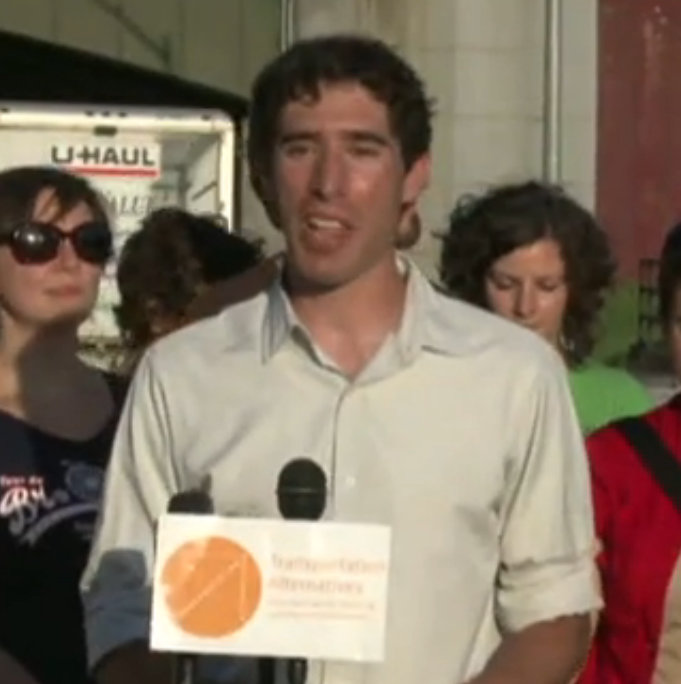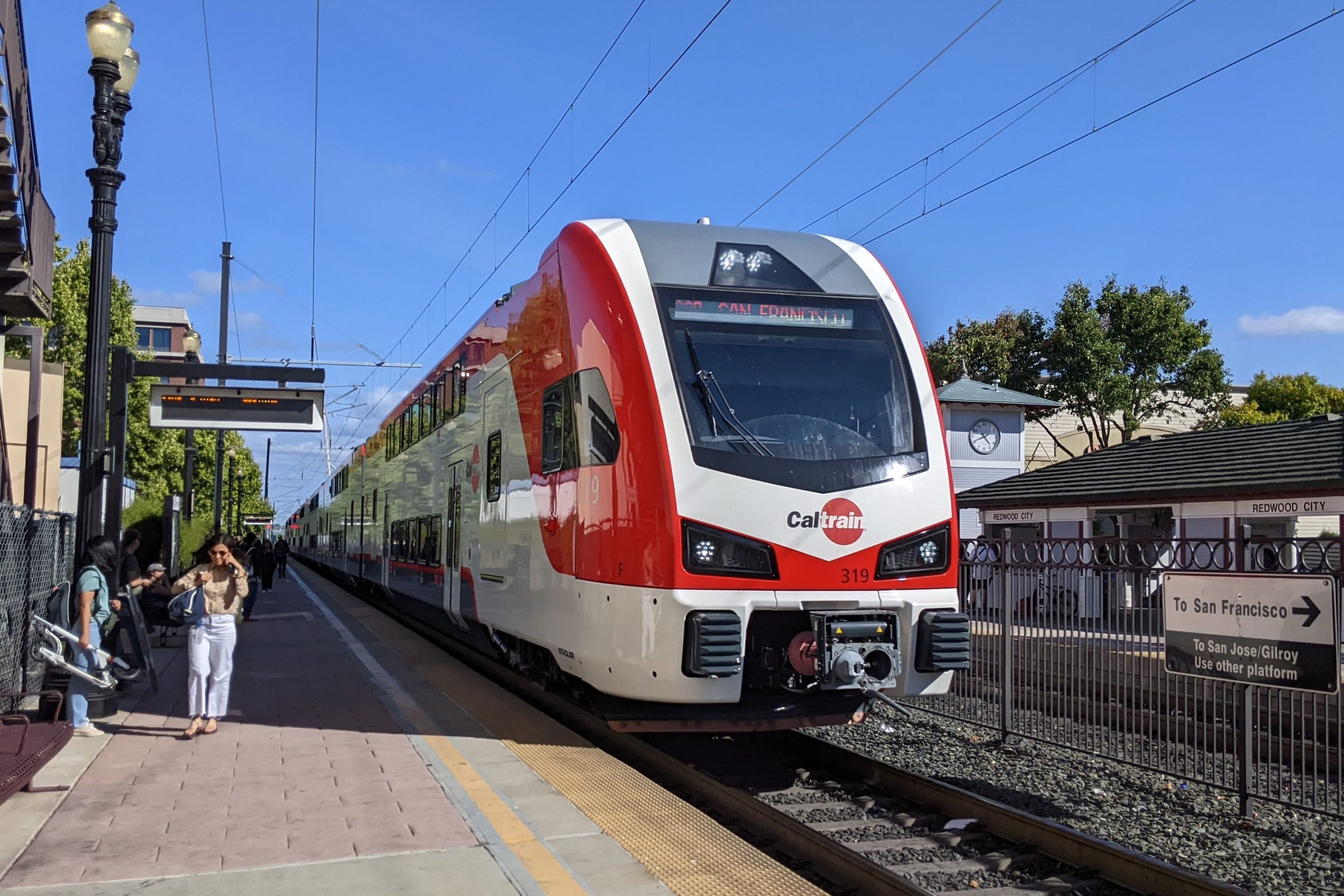Noah Budnick, an accomplished advocate for safe streets and effective transit in New York City, has been named the San Francisco Bicycle Coalition's new executive director and will succeed Leah Shahum, who will step down after 12 years leading the organization.
Budnick has built a strong national reputation among livable streets advocates in his 14 years at Transportation Alternatives, where he currently serves as the chief policy officer. TA is NYC's advocacy organization for walking, bicycling, and transit, and has 11,000 members -- slightly more than SFBC. The SFBC said Budnick was chosen by its board of directors after an "exhaustive nationwide search."
"Noah comes to San Francisco as a leader and team builder in the movement for bikeable and livable cities," said Lawrence Li, president of the SFBC board. "He is a well-regarded and proven political and communications expert who inspires, builds coalitions and wins on street changes and laws that create safer streets for all of us. He is a seasoned organizational manager who brings timely and relevant experiences."
In a statement, Budnick said the selection is "a true honor," and that the SFBC's "strong and active membership and the alliances it has formed inspire my work."
"I'm looking forward to building on the momentum of recent years and the long history of the organization and the bicycle movement to improve San Francisco," he said. "There is incredible energy across the country to transform cities into healthy, livable places, and I'm so excited to work with communities around the city to put San Francisco on the forefront of this transformation."
Budnick said he's worked with Shahum over 10 years -- he chairs the board of the national Alliance for Biking and Walking, and invited Shahum to the board, where she's currently the vice chair.
Although Budnick hasn't lived in SF, the city has long been on his radar. Budnick's wife, whom he met while bicycling in NYC, is a San Francisco native, and he told Streetsblog they regularly visit SF to see family members, who happen to be longtime SFBC members. Before moving to NYC, Budnick attended the first Bike Summer in SF in 1999. He grew up in Vermont, and has lived in Boston and Colorado.
"New York and San Francisco have this great sibling rivalry in a way," said Budnick. "They're cities that really believe in bicycling and have organizations that are well-established and have really committed and active members. TA staff and SFBC staff have for years worked with each other to compare notes."
"Because the city has strong neighborhoods and really engaged people, there's tons of opportunity in San Francisco to improve the city for bicycling," he added. "I think bicycling improvements are gonna add a lot of benefits for people who don't ride bikes, and vice versa -- walking improvements and transit improvements are gonna bring a lot of good to bike riders as well."
Budnick once debated with Rob Anderson, who sued SF over its Bike Plan (delaying it for years), on a 2008 edition of National Public Radio's "Talk of the Nation." He was also featured alongside Anderson and Shahum in a Wall Street Journal article on the issue at the time.
Last month, Streetsblog USA interviewed Budnick about the TA-hosted Vision Zero Symposium, a first-of-its-kind national event held in NYC. "In San Francisco," he said, "the broad coalition and engagement on Vision Zero is impressive. New York City did a lot of public outreach in terms of town hall meetings and hearings and online, but I think what they’ve done in San Francisco with the Vision Zero coalition is good work for us to note."
In NYC, Budnick served on Mayor Bill de Blasio’s transition team, and advocates credit him with helping to "make Vision Zero and street safety a top priority for the incoming mayor."
TA Executive Director Paul Steely White said Budnick's transcontinental departure comes with "a mixture of excitement and sadness."
"During his time at TA, Noah has become well known around the city, state and nation as a knowledgeable and tireless advocate for safer streets and better transportation options," said White. "Noah has played a key role in the ascendancy of biking and walking under Mayor Bloomberg, and in the successful transition to Mayor de Blasio and the Vision Zero era."
"Anyone who has worked with Noah knows that he possesses a rare combination of zeal and judiciousness. Noah's humanizing impact on the streets of New York City will be felt for generations to come."
Budnick is credited with overseeing numerous successful TA campaigns for safer streets in NYC, from its recently-implemented 25 MPH speed limit, to pushing the NYPD to use data-driven traffic safety enforcement, to getting parking-protected bike lanes on Manhattan’s Eighth and Ninth Avenues and pushing for safer taxi and for-hire vehicle regulations. He also contributed to advocates’ Bike Safety Action Plan, which prompted a multi-agency response to cyclist injuries and fatalities.

TA informally named a protected bikeway the "Budnick Bikeway" that opened on NYC's Sands Street approach to the Manhattan Bridge in 2009. Budnick was hospitalized after a crash at the bridge approach in 2005 and lost his memory for several days. After that, he helped ensure the safer bicycling link became a reality. (Budnick recounted the events in a two-part interview on The Bicycle Story.)
Budnick isn't the only transportation talent to come to SF from NYC recently. In October, Tom Maguire started as the SFMTA's new Sustainable Streets director, after serving as an executive at the NYC Department of Transportation.
“San Francisco is so fortunate to have Noah’s tremendous experience and passion for great cities and smart transportation heading our way," said Shahum, the SFBC's outgoing director, in a statement. "I’ve had the good fortune to work with Noah for many years, and I am impressed with his leadership and ability to bring people together to get things done. I’m excited about and confident in Noah’s ability to lead the SF Bicycle Coalition into its next great chapter, along with our strong staff, board and membership.”
Budnick is expected to start as head of the SFBC early next year. When asked what lessons he plans to apply in his new role, he named one advocacy and organizing strategy in particular. "You've gotta meet people where they're at," he said. "You can't assume that what you think is a great idea is what other people agree with. You have to find common ground and figure out what other people care about. That's core to building partnerships and coalitions."
"Every city's different, all politics are local, and while our cities share a lot of common values and similarities, I want to come in as wide-eyed as I can to learn what makes San Franciscans really love their city."






